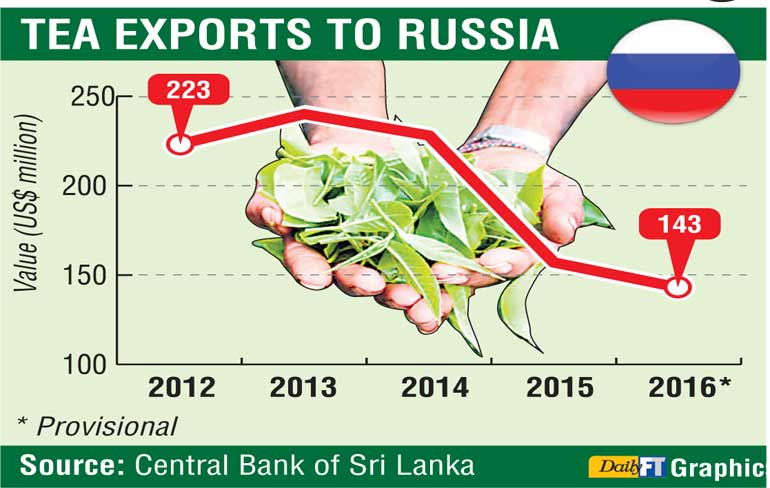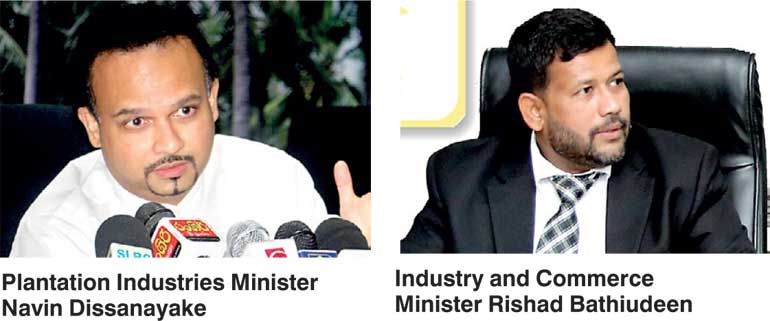Saturday Feb 21, 2026
Saturday Feb 21, 2026
Tuesday, 19 December 2017 00:00 - - {{hitsCtrl.values.hits}}

By Chathuri Dissanayake
A six-member team is headed to Russia on Wednesday for a discussion on Friday regarding the technical requirements of quarantine standards Sri Lanka has to meet to get the temporary ban on Sri Lankan tea lifted, according to Minister Navin Dissanayake.
A ministerial delegation will follow the technical discussion.
“The Industry and Commerce Minister Rishad Bathiudeen and I will go for a discussion once the technical team gives a proposal on the matter,” Plantation Industries Minister Dissanayake told the Daily FT.
In a bid to negotiate the relaxation of the ban, the Minister also met the Russian Ambassador in Sri Lanka Yuri B. Materiy.
He also said officials were working around the clock to urge the Russian Government to lift the ban imposed on Sri Lankan tea imports following a detection of a single specimen of an agricultural pest.
The ban came into effect yesterday, affecting as much as 60-70 containers of tea loaded for shipment, Tea Exporters Association Chairman Jayantha Karunaratne estimated.
A team of technical experts comprising the Director General of Agriculture, Additional Director of Plant and Quarantine Division, Director General of the Tea Research Institute, a member from the technical team of the Tea Board, the Director General of the Commerce Department and Additional Secretary of the Ministry of Plantations will be travelling to Russia on Wednesday to discuss the issue, the Minister said.
Calling the move to impose a blanket ban by Russian authorities “highly unusual”, the Minister said there was no warning before the ban was imposed.
“Usually the consignment that was found fault with will be destroyed or there would be more stringent testing imposed, not a blanket ban. However, the current situation is that there is a ban and we have to work towards lifting it,” he said.

Highly-placed Government sources claimed the ban was of a “very political nature” where Russia is involved in a tit-for-tat move following Sri Lanka’s ban on the importation of asbestos roofing material into the country from 2018, mainly imported from Russia. According to sources this too will be discussed through different diplomatic channels in an effort to negotiate a relaxation of the ban imposed on Sri Lankan tea. The beetle Trogoderma granarium was found in the packaging material of a consignment of tea shipped from Sri Lanka. The Agriculture Department has already commenced an investigation to determine how the beetle was introduced to the consignment, Plantation Ministry Secretary J.A. Rajith said. “This is a very unusual situation so we are also keen to understand what has happened. The investigations are at a very preliminary stage so we cannot say anything yet,” he said.
Tea exporters on Sunday rushed to load and obtain the necessary documentation to beat the ban, which came into effect yesterday, halting shipments to Russia, one of the biggest importers of Ceylon Tea.
“A fairly big quantity will be affected from this ban at present. We are still trying to get an estimation of the impact. Those containers which have been loaded will have to be removed now, and the exporters have stopped loading the tea meant to be exported to Russia,” said the Tea Exporters Association Chairman.
Although the full impact of the ban was not felt at the tea auction yesterday, he expects the effects to take root later in the week.
“If this goes on for longer than two weeks then the tea producers will also feel the full impact,” Karunaratne predicted.
Minister Bathiudeen in a statement expressed optimism that the Ceylon Tea ban by the Russian Federation would be resolved soon.
“I am optimistic of a quick solution,” said the Minister after his urgent consultations with top officials from his ministry on 17 December. “Russia and Sri Lanka have long-standing, friendly and cordial relations. This ban is not a refusal of Sri Lanka by Russia but only a temporary stoppage of one export product from us. The only reason for our concern is that nearly 80% of our exports to Russia is Ceylon Tea. We praise President Maithripala Sirisena for his prompt action in contacting the highest levels of the Russian Government to resolve this. I am optimistic of a quick solution,” said Minister Bathiudeen.
Last year (2016) Russia ranked as the second largest buyer of all types of Ceylon Teas (including green tea made in Sri Lanka) at $ 143 million – the leading buyer in 2016 was Iran at $ 154.10 million. However, in 2015 Russia was the topmost buyer of Ceylon Tea at $ 156.65 million and the second leading buyer was Turkey.
According to the Department of Commerce, nearly 74% of Sri Lanka’s exports to Russia in 2016 was Ceylon Tea at a value of $ 143 million (while total exports to Russia in the same year was $ 182 million). Over the years, total tea exports to Russia have shown a declining trend – $ 240.32 million in 2013, $ 228.27 million in 2014, $ 156.65 million in 2015 and $ 142.55 million in 2016. Ceylon Tea exports to Russia from January to August this year totalled $ 114.18 million (83% of all types of Lankan exports to Russia from January to August 2017). The other main items that Sri Lanka exports to Russia are apparel, vegetable textile fibres and other clothing accessories (including gloves). Sri Lanka’s total trade (both imports and exports) with the Russian Federation was at $ 435.83 million in 2015 but declined to $ 381.71 million in 2016. This year from January to August, a total of $ 260.78 million was reported.
TEA INDUSTRY OVERVIEW: JANUARY TO SEPTEMBER